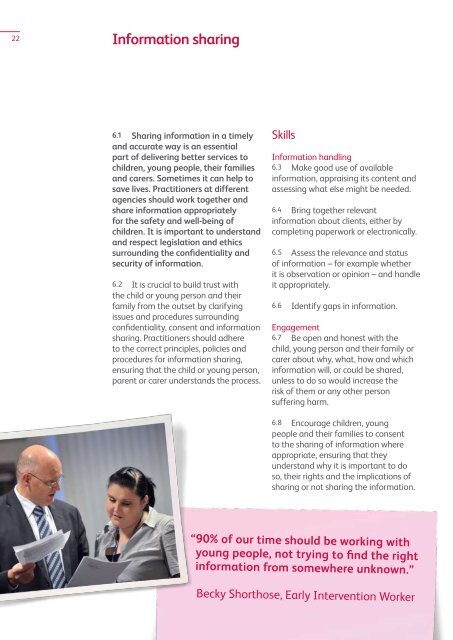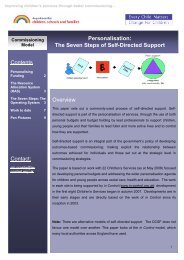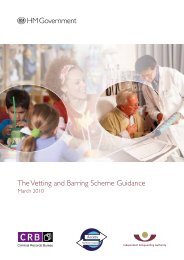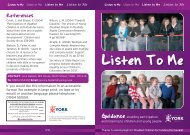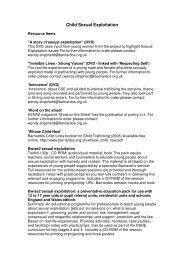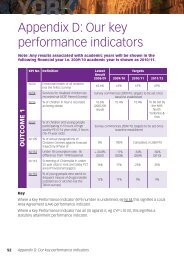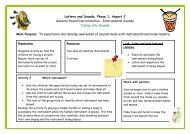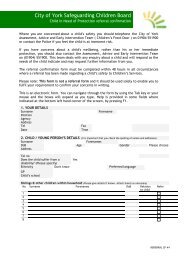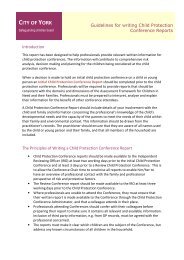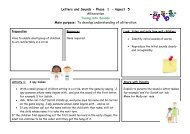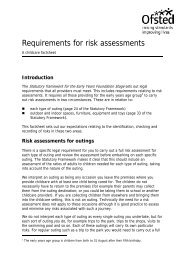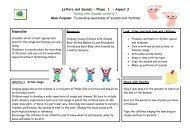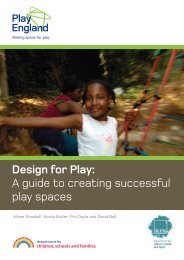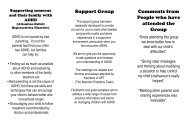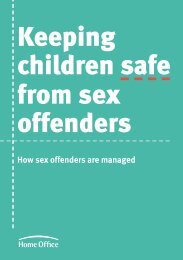The common core of skills and knowledge - Knowledge Hub
The common core of skills and knowledge - Knowledge Hub
The common core of skills and knowledge - Knowledge Hub
Create successful ePaper yourself
Turn your PDF publications into a flip-book with our unique Google optimized e-Paper software.
22<br />
Information sharing<br />
6.1 Sharing information in a timely<br />
<strong>and</strong> accurate way is an essential<br />
part <strong>of</strong> delivering better services to<br />
children, young people, their families<br />
<strong>and</strong> carers. Sometimes it can help to<br />
save lives. Practitioners at different<br />
agencies should work together <strong>and</strong><br />
share information appropriately<br />
for the safety <strong>and</strong> well-being <strong>of</strong><br />
children. It is important to underst<strong>and</strong><br />
<strong>and</strong> respect legislation <strong>and</strong> ethics<br />
surrounding the confidentiality <strong>and</strong><br />
security <strong>of</strong> information.<br />
6.2 It is crucial to build trust with<br />
the child or young person <strong>and</strong> their<br />
family from the outset by clarifying<br />
issues <strong>and</strong> procedures surrounding<br />
confidentiality, consent <strong>and</strong> information<br />
sharing. Practitioners should adhere<br />
to the correct principles, policies <strong>and</strong><br />
procedures for information sharing,<br />
ensuring that the child or young person,<br />
parent or carer underst<strong>and</strong>s the process.<br />
Skills<br />
Information h<strong>and</strong>ling<br />
6.3 Make good use <strong>of</strong> available<br />
information, appraising its content <strong>and</strong><br />
assessing what else might be needed.<br />
6.4 Bring together relevant<br />
information about clients, either by<br />
completing paperwork or electronically.<br />
6.5 Assess the relevance <strong>and</strong> status<br />
<strong>of</strong> information – for example whether<br />
it is observation or opinion – <strong>and</strong> h<strong>and</strong>le<br />
it appropriately.<br />
6.6 Identify gaps in information.<br />
Engagement<br />
6.7 Be open <strong>and</strong> honest with the<br />
child, young person <strong>and</strong> their family or<br />
carer about why, what, how <strong>and</strong> which<br />
information will, or could be shared,<br />
unless to do so would increase the<br />
risk <strong>of</strong> them or any other person<br />
suffering harm.<br />
6.8 Encourage children, young<br />
people <strong>and</strong> their families to consent<br />
to the sharing <strong>of</strong> information where<br />
appropriate, ensuring that they<br />
underst<strong>and</strong> why it is important to do<br />
so, their rights <strong>and</strong> the implications <strong>of</strong><br />
sharing or not sharing the information.<br />
“90% <strong>of</strong> our time should be working with<br />
young people, not trying to find the right<br />
information from somewhere unknown.”<br />
Becky Shorthose, Early Intervention Worker


